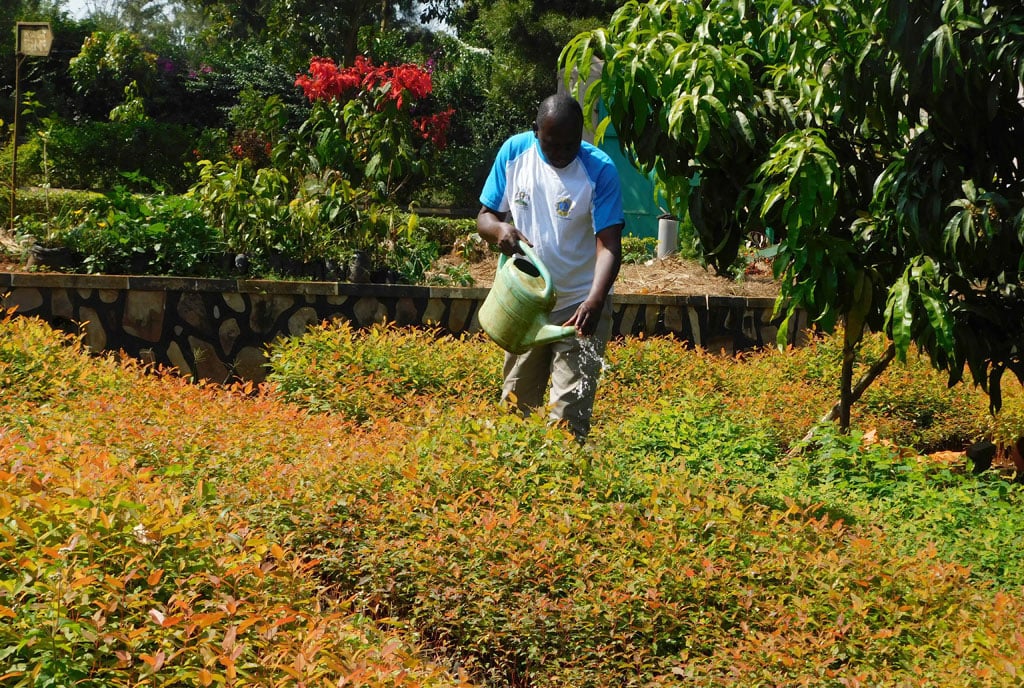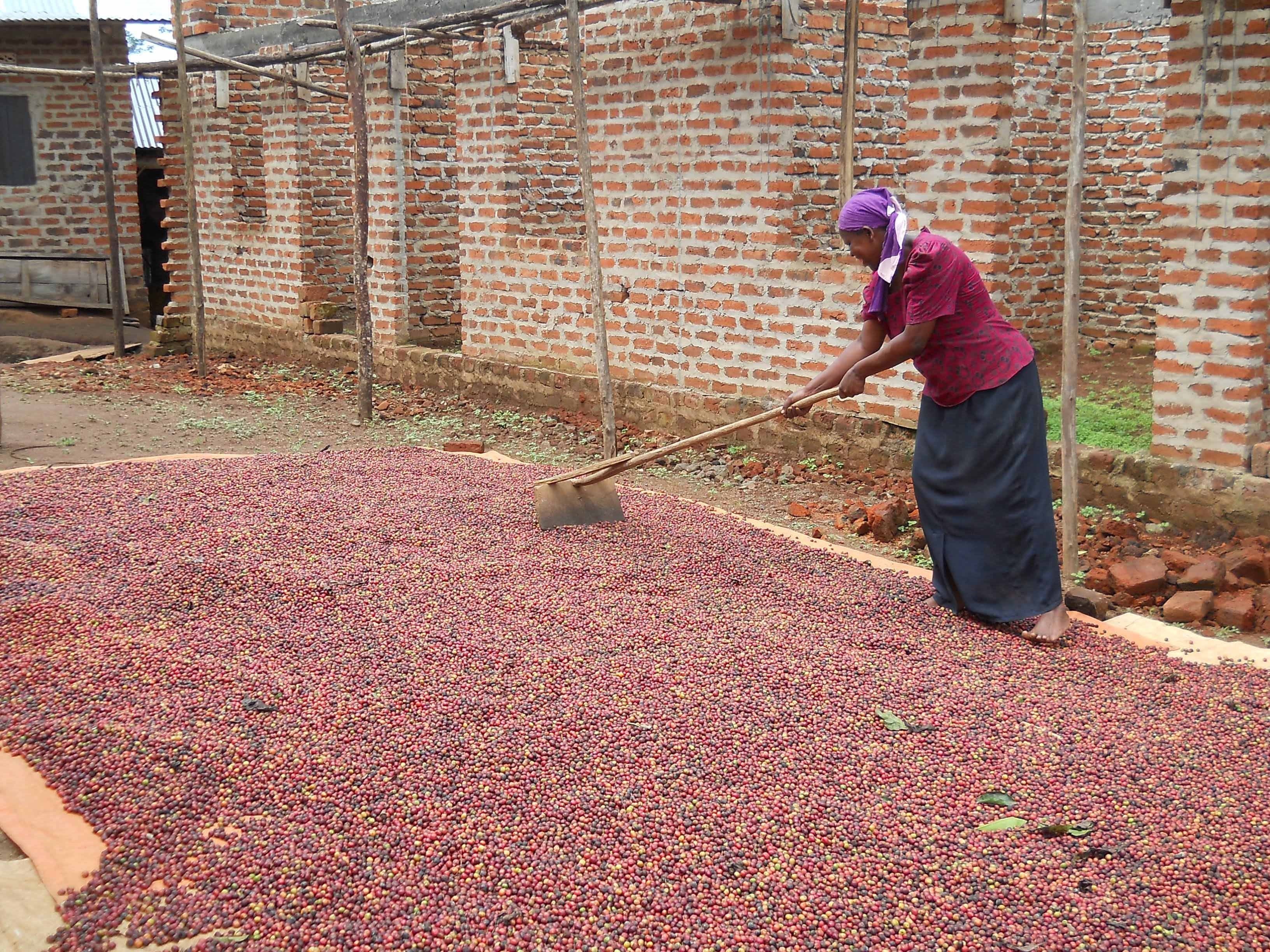
Ms Lucian Olyera, a coffee farmer, in her plantation in Erussi Sub-county, Nebbi District. The coffee sector contributes positively to Uganda’s exports. PHOTO | PATRICK OKABA
A new report by the Bank of Uganda (BoU) has revealed that the country’s Balance of Payments (BoP) remained vulnerable over the 12 months leading up to March 2024, impacted by elevated global economic uncertainty.
In its Monetary Policy Report of June 2024, the Bank of Uganda said, as trade imbalances persist, the current account deficit (CAD) has increased 1.6-fold in the last five years. The CAD occurs when the total value of goods and services a country imports (its expenditure) exceeds the value of goods and services it exports overseas (its income), leading to constant outflow of foreign exchange in financing imports.
“In addition, the deteriorating primary income account deficit owing to the mounting interest payment on public debt and profit repatriation by corporations is adding to the pressures of trade imbalances. As the pressures continue to accelerate, the current account deficit widened by 11.6 percent in the 12 months to April 2024 to reach $4.4 billion,” the central bank revealed.
The central bank also said the effects of the receding global commodities prices (lower import prices) were temporary.
“We have seen the deficit on the goods account returning to levels seen at the peak of the global commodities prices triggered by the Russia-Ukraine conflict,” it said of the country’s CAD which has stayed on a steady deterioration path since 2020.
Mixed bag
The central bank said the deficit arising from trade in goods was somewhat narrowed by 4.8 percent to $3.3 billion in the 12 months to April 2024 due to support from the resumption of gold trade and better price for coffee. The report shows that while the financial surplus expanded in compensation for the wider current account deficit, net capital inflows fell short of the deficit, resulting in a reserve drawdown during the year to March 2024.
The CAD in the year to March 2024 was 8.6 percent wider than a deficit of $3.9 billion registered in the year to March 2023, reflecting deterioration in all sub-accounts, save for the trade balance.
Despite the increased travel receipts and higher income earned on reserve assets registered in the reporting year relative to the previous year, both the services and primary income deficits widened, by 20.6 percent and 15.0 percent to $1.6 billion and $1.1 billion, respectively, due to high transport payments in line with import growth, and a higher cost of external debt service reflected year-on-year.
Furthermore, the secondary income surplus narrowed by 8.1 percent to $1.8 billion primarily on account of lower grant inflows.
On the upside, the deterioration in the current account balance was tempered by improvements in the performance of external trade. The merchandise trade deficit contracted, from a deficit of $3.5 billion, down to a deficit of $3.2 billion, primarily on account of a 55.1 percent increase in export revenue, which exceeded the 28.3 percent increase in import expenditure, year-on-year.
Gold, coffee to the rescue
Export growth was supported by a net gold trade surplus of $139.2 million, increased external demand and favourable commodity prices. Exports of goods grew by 51.3 percent supported by a quadrupling of gold trade and a 21.4 percent growth in coffee export revenues. Gold exports climbed to reach $2.8 billion after resolving the tax disputes on gold exports that had led to the halt of gold trade.
The international price of coffee has surged since the last quarter of 2023 with Robusta coffee prices reaching an average level that is 43 percent higher compared to the average level obtained in 2023.
The central bank disclosed that a three percent increase in Uganda’s coffee export volume explains the coffee export proceeds surge from 12 months to April 2024. The upsurge in international coffee prices reflects the increasing global demand amid the fractured supply line of major producing countries.
The central bank, however, pointed out that, the gold trade notwithstanding coupled with rather modest imports from the government, the deficit on the goods account remained high at $3.3 billion in the 12 months to April 2024. This, it added, reflects the strong private sector imports, especially the non-oil, driven by the importation of machinery.
“The deficit would have been even wider, thanks to Terms of Trade improvement, which has persisted since 2023,” said the BoU.
The central bank further stated that the deficit arising from the trade in services also remains a drag on the current account and bulged by 19 percent in the 12 months to April 2024 to reach $1.7 billion. The widening services deficit largely reflects mounting payments for transportation services that have more than offset the relatively strong inflows from tourism.
Furthermore, a notable increase in the importation of machinery and equipment was registered year-on-year, fuelled by advancements in the development of Uganda’s oil sector projects.
The primary income account deficit has continued to increase, reaching $1.2 billion. This, the BoU notes, reflects the mounting outflows in the form of interest payments to external and portfolio public debt and externalisation profits by corporates which have grown by 23 percent in the 12 months to April 2024 to Shs1.3 billion.
The primary income account shows primary income flows between resident and non-resident institutional units. Primary income represents the return that accrues to institutional units for their contribution to the production process or for the provision of financial assets and retaining natural resources to other institutional units. Elsewhere, the secondary income shows current transfers between residents and non-residents.
Few borrowing options
Consequently, the central bank explained in its report that the surplus on the secondary income account surplus contracted owing to dwindling grants to the government and negative growth in personal transfers observed in the last 12 months. Personal transfers for the first time in five years have registered negative growth at 6.7 percent even though $1.2 billion remains above the recent five-year average level.
“The current account has been largely financed by foreign direct investments (FDI) and loans to the government captured under the other investments. FDI inflows worth $3.012 billion in the 12 months to April 2024 remain buoyant largely reflecting the ongoing activity in the oil-related projects. Loans to the general government net of principal repayments amounted to $978.3 million,” the bank monetary policy report reads in part.
The central bank said the net loans to the government are below the average for the last decade, half owing to tight global financial conditions and the upsurge of principal loan repayments, which has since more than tripled.
Weighed down by the continued outflow of portfolio capital, the financial account at $3.8 billion was inadequate to cover the deficit on the current, and capital account, resulting in a drawdown of reserves to the tune of $148.7 million. Consequently, the reserve amounted to $3.4 billion equivalent to 3.2 months cover of future imports of goods and services slightly lower than the 3.4 months in April 2023.
The central bank said the financing of the current account deficit is expected to continue to be from FDI projected at above 5.0 percent of GDP in the next two financial years before moderating to around 3.3 percent of GDP in the fiscal year (FY) 2027/2028.
Eacop, coffee hurdles
Loans are expected to provide minimal financing, especially the next financial year, given the tight global financial conditions, but could pick up later as the financial conditions normalise.
Financing is projected to be more than adequate to facilitate the accumulation of international reserves going forward, the report revealed. The major downside risks to this outlook include delays in oil production and related projects such as the East African Crude Oil Pipeline (Eacop).
The delayed implementation of a traceability system for the five commodities, including coffee in conformity with the European Union (EU) law, which will come into force in 2025, banning the importation of the commodities linked to deforestation, also has not helped matters.
On the other hand, a deceleration in the growth rate of oil imports was registered in the year to March 2024, reflecting a 13 percent year-on-year contraction in global oil prices.
In terms of financing, capital inflows strengthened. The financial account surplus expanded from $2.9 billion in the year to March 2023, to $3.7 billion in the year to March 2024.
Foreign Direct Investment (FDI) inflows remained robust, maintaining a relatively stable surplus at $3 billion, up from $2.9 billion, year-on-year, reflecting investor optimism regarding the domestic investment climate amid progression in development of the oil-sector projects and associated spillovers.
Net portfolio outflows contracted by 65.3 percent, supported by a notable slowdown in offshore investors’ exit pace from the domestic securities market (86.5 percent year-on-year contraction in net exit).
The surplus was further boosted by a 74.7 percent year-on-year increase in donor support inflows, specifically budget support loan inflows, largely reflecting disbursements under the IMF-ECF Programme.
In sum, a BoP deficit of $202.5 million was registered in the year to March 2024, a 76.9 percent improvement from a BOP deficit of $875.8 million in the year to March 2023.
Accordingly, gross international reserves contracted to $3.4 billion, with reserve cover falling to 3.3 months of future imports, down from $3.6 billion (3.5 months of future imports), in the years to March 2024 and 2023, respectively.
Optimism
Conversely, the BoU is optimistic that the current account deficit is projected to steadily narrow in the medium term, driven by a progressive reduction of the trade deficit and expected oil production.
In the Monetary Policy report of June 2024, the BoU said this trend will be supported by a gradual rise in oil export revenues. The first oil production is expected in FY 2025/2026 and would accelerate to 230,000 barrels per day in a few years, boosting exports in addition to the strong demand from the region benefiting from resolving several trade disputes with the neighbours.
“Imports are expected to remain steady, in line with public infrastructure developments and oil projects-related imports. Additional support for the narrowing of the Current Account is expected to come from the steady remittance and tourism inflows given the many government initiatives to streamline the externalisation of labour and boost tourism,” said the central bank.
While presenting the budget for the FY2024/2025 on June 13, the Minister of Finance, Mr Matia Kasaija, said the government’s Export Promotion Strategy has continued to produce positive results.
“During the year ending April 2024, Uganda’s exports increased by $2.5 billion to $7.4 billion compared to $4.9 billion in April 2023, representing a 34 percent growth,” he said, adding, “In the financial year ending, Uganda imported goods worth $12.9 billion compared to $10.3 billion in the year ending April 2023. This increase in imports was largely driven by an increase in private sector imports of 23 percent, mainly to develop our nascent oil and gas sector.”




